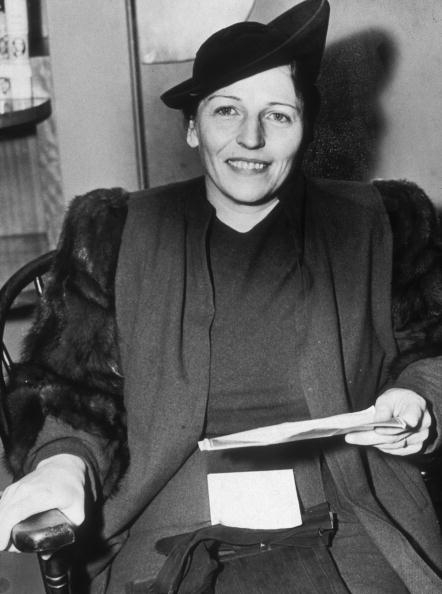You have /5 articles left.
Sign up for a free account or log in.

Pearl S. Buck holds cablegram announcing she's received the Nobel Prize for literature.
Getty Images
Recent news coverage about the Confucius Institutes in the United States provides a sobering summary of the concerns and controversies swirling around the institutes. The concerns involve, in particular, questions about academic freedom and institutional autonomy, and the possible importation of Chinese state censorship when it comes to teaching and scholarship. And those concerns have resulted in criticism from legislators on both sides of the political aisle as well as the decision by a growing number of colleges and universities to close down the institutes on their campus.
For these reasons, including increased political attention and pressure, the Confucius Institutes face an uncertain future. But the purposes these institutes were ostensibly created to achieve -- engaging in public outreach and offering Chinese language and culture classes and programs -- remain valid. In fact, as daily headlines about China’s global role and the trade war between China and the U.S. demonstrate, this work is more important now than ever.
If the Confucius Institute model has run its course, we should think about and plan for what comes next. Understanding China is too important and deserves institutional support. We believe that Pearl S. Buck’s life and work offer a compelling example and organizing framework for studying and thinking about China and China-U.S. relations. Therefore, we propose a new initiative to promote cultural and educational programming about China and the United States: the Pearl S. Buck Society.
Pearl S. Buck led an extraordinary life. Born in Hillsboro, W.V. in 1892, she spent much of her youth in China as the daughter of American missionary parents. She attended what was then Randolph-Macon Woman’s College (now Randolph College) in Lynchburg, Va., graduating with a degree in philosophy in 1914.
After earning a M.A. in English from Cornell, Buck gained prominence in America after winning the Pulitzer Prize for fiction in 1932. She became a global celebrity after winning the Nobel Prize for literature in 1938. She is one of only two American women (Toni Morrison is the other) to win both a Pulitzer and a Nobel Prize. Her most famous novel, The Good Earth, helped to introduce China to many readers in the West. According to China scholar and historian James Thomson, Pearl S. Buck was “the most influential Westerner to write about China since 13th-century Marco Polo.” Buck’s career as a writer and public speaker was dedicated to advocating for human rights and demolishing barriers to international understanding, particularly between China and the United States.
As China and the United States strive to understand each other’s culture, history and worldview, Buck’s life and writings offer a distinct teaching and learning resource. Randolph College and West Virginia University (WVU) are home to two of the largest academic collections of Buck-related materials. By making these materials more accessible to researchers, we seek to expand scholarship about Buck and her influence. In late 2018, the WVU Press published a new collection of essays, Beyond the Good Earth: Transnational Perspectives on Pearl S. Buck, which is a step in this direction.
With outreach efforts that include lifelong learning courses and international academic conferences, we seek to increase public awareness of Buck and her legacy. Since 2016, WVU has co-hosted two conferences and provided travel grants for researchers to use the Pearl S. Buck Manuscript Collection at the WVU Libraries. The university also hosted a summer professional development institute for social studies and English language arts teachers to help them incorporate Buck into their classrooms. To honor its 125th anniversary in 2016, Randolph College reinstated the Pearl S. Buck Award, presented to women who exemplify Buck’s ideals, values and commitments. The 2016 recipient was Maxine Hong Kingston, author of The Woman Warrior: Memoirs of a Girlhood Among Ghosts. The Pearl S. Buck birthplace in Hillsboro also serves as an important partner, academic resource and historical and cultural tourism destination.
By reaching out to a global audience, we hope to create international exchanges and partnerships that build on recent significant investments in China, including the new Pearl S. Buck Park and Museum in Zhenjiang. All of this, and much more, can be done under the auspices of a new Pearl S. Buck Society that serves as a resource and a coordinating body for anyone -- not just in the United States but everywhere -- interested in this exceptional author and humanitarian.
For example, WVU is negotiating with the Pearl S. Buck Research Association in Zhenjiang, China; the Pearl S. Buck Memorial Hall in Bucheon, South Korea; and Pearl S. Buck International in Perkasie, Pa., to sponsor annual conferences with host duties rotating among China, South Korea and the United States. The first of these conferences will take place in Zhenjiang this September, and the second will be at WVU in fall 2020. We are working on new curricula -- from middle school lesson plans to interdisciplinary collegiate courses -- to introduce Buck to a new generation of students and readers. We are also trying to harness the power of technology to make these materials as widely accessible as possible. We encourage other institutions, organizations and scholars with interest in Pearl S. Buck to join us in these and other endeavors.
When world leaders gathered at the United Nations in September 2017, China’s minister for foreign affairs, Wang Yi, observed, “We live in an era that is defined by a deepening trend toward a multipolar world … a world that is witnessing profound changes in the international landscape and balance of power.” In the midst of these profound changes, Pearl S. Buck can be a guide and compass to bilateral, and international, understanding.




